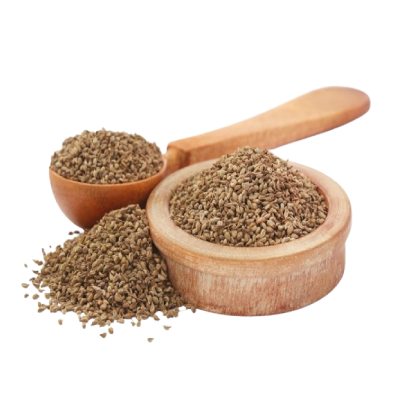Ajwain's small, oval, seed-like fruits are pale brown schizocarps, which resemble the seeds of other plants in the family Apiaceae such as caraway, cumin, and fennel. They have a bitter and pungent taste, with a flavor similar to anise and oregano. Ajwain seeds, also known as carom seeds, are the seeds of the ajwain plant. The plant is an annual herb in the Apiaceae family, and is native to the eastern regions of Persia and India.

Ajwain seeds, also known as carom seeds or bishop's weed, are small, ridged, oval-shaped seeds with a unique and pungent flavor profile. They belong to the Apiaceae family and are native to regions of India, Iran, and Egypt. Ajwain seeds have been used for centuries in traditional medicine and culinary practices across various cultures.
The seeds have a distinctive aroma, reminiscent of thyme, with a slightly bitter and peppery taste. They contain essential oils such as thymol, which contributes to their strong fragrance and medicinal properties. Ajwain seeds are often used as a spice in Indian, Middle Eastern, and North African cuisines, where they add depth and complexity to dishes.
In cooking, ajwain seeds are commonly toasted or dry-roasted to enhance their flavor before being added to dishes. They are frequently used in bread, lentil, and vegetable dishes, as well as in pickles, chutneys, and savory snacks like pakoras and samosas. Additionally, they are sometimes chewed raw after meals in India as a digestive aid due to their carminative properties.
Beyond their culinary uses, ajwain seeds are valued for their potential health benefits. They are believed to aid digestion, alleviate indigestion and gas, relieve respiratory issues, and even act as an antimicrobial agent. In traditional medicine, ajwain seeds are often incorporated into remedies for various ailments ranging from stomach disorders to colds and coughs.
Overall, ajwain seeds are a versatile spice with a rich history of culinary and medicinal use, prized for their bold flavor and potential health-promoting properties.
